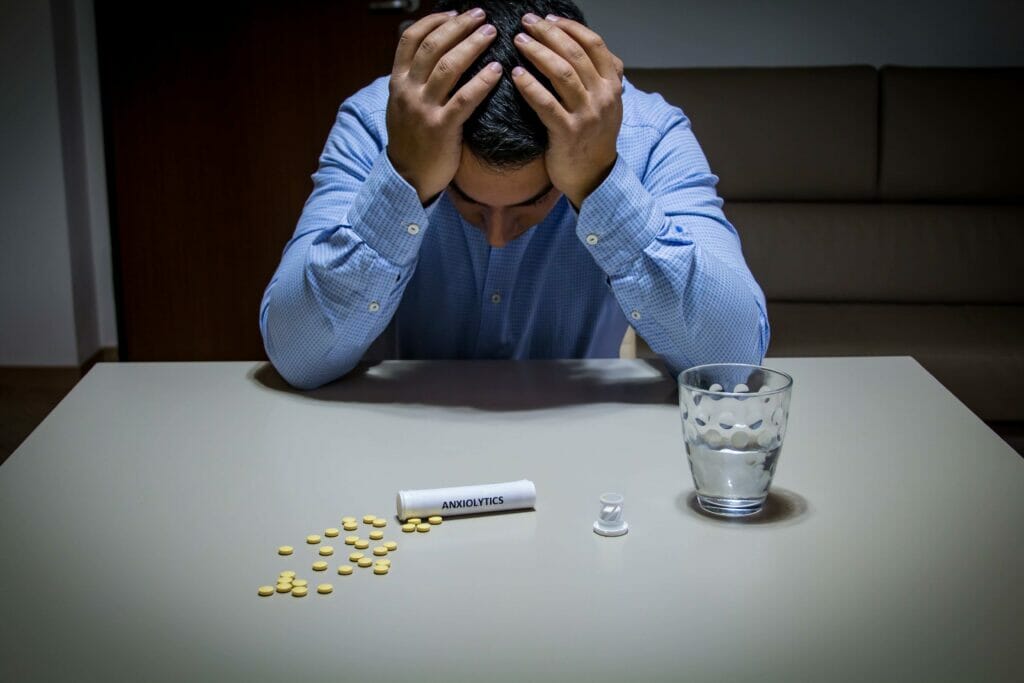Understanding Benzodiazepines and Sedatives: Addiction Risk and Treatment

Stress, anxiety, and sleep disorders have become prevalent issues impacting our well-being. To help address these challenges, medical science has introduced a class of drugs known as benzodiazepines and sedatives, which promise relief from the grip of these conditions. However, their tranquil facade comes with a hidden danger — the potential for addiction. The good news is that addiction treatment programs help guide individuals toward a healthier and drug-free life.
What Are Benzodiazepines and Sedatives?
Benzodiazepines (benzos) and sedatives are a group of pharmaceutical drugs primarily prescribed for their anxiolytic (anxiety-reducing), sedative (sleep-inducing), and muscle-relaxing properties. These substances enhance the activity of gamma-aminobutyric acid (GABA), a neurotransmitter that inhibits brain activity, resulting in a calming and sedating effect.
Typically, doctors prescribe benzodiazepines, such as Valium, Xanax, and Ativan, to alleviate anxiety, panic disorders, and insomnia, while sedatives like Ambien and Lunesta target sleep disturbances. Both benzodiazepines and sedatives can offer much-needed relief for those grappling with overwhelming emotions and sleeplessness, helping them regain control over their lives.
Benzodiazepine and Sedative Use in Missouri
Recent data reveals that a substantial portion of the population in Missouri turns to benzodiazepines and sedatives to combat strains of anxiety and sleep disturbances. According to the Missouri Department of Health and Senior Services, an estimated 15% of adults in the state have been prescribed these medications at some point in the last year. This highlights the prevalence of these substances as coping mechanisms. However, this pursuit of relief can increase the risk of addiction.
Are Benzodiazepines and Sedatives Addictive?
Although effective, benzodiazepines and sedatives are considered addictive because of their effects on the brain and body, which can lead to physical and psychological dependence over time. Generally, individuals become addicted to these substances because:
- They interact with specific brain receptors that regulate anxiety, stress, and sleep. While this interaction can provide relief, it alters the brain’s natural balance, potentially leading to dependency.
- Continued use of benzodiazepines and sedatives causes individuals to need higher doses of the drugs to achieve the same calming effects they initially experienced. This phenomenon is known as tolerance and is a hallmark of addiction.
- When individuals suddenly stop or reduce their dosage, individuals experience uncomfortable and dangerous withdrawal symptoms, such as anxiety, insomnia, tremors, sweating, and seizures.
- Individuals can become emotionally attached to the relief and relaxation these drugs provide, using them to cope with stress, anxiety, or difficult emotions. Over time, the belief that they need these substances to function or feel better can become deeply ingrained.
Additionally, certain factors can make individuals more vulnerable to developing an addiction to benzodiazepines and sedatives. These factors include a personal or family history of substance abuse, mental health disorders, social or environmental influences, and using the drugs for reasons other than their intended medical purposes.
Signs of Benzodiazepine and Sedative Addiction
Recognizing the signs of benzodiazepine and sedative addiction is crucial for early intervention and treatment. Some of the most common signs of addiction to benzodiazepines and sedatives include:
- Increased tolerance, or the need for higher doses of benzodiazepines or sedatives to achieve the same calming effects
- Cravings
- Loss of control
- Neglecting responsibilities
- Social isolation
- Taking higher doses, using the drugs more often, or using them without a medical reason
- Doctor shopping
- Slurred speech, impaired coordination, and drowsiness
- Neglecting health
- Withdrawal symptoms
- Mood swings
- Diminished interest in once enjoyable activities
- Financial issues
- Failed attempts to quit
Treating Benzodiazepine and Sedative Addiction
Treating addiction to benzodiazepines and sedatives requires a comprehensive approach that addresses both addiction’s physical and psychological aspects. Some of the most common components of treatment include:
- Medical Detoxification: Detoxification involves gradually tapering the dosage of benzodiazepines or sedatives to minimize withdrawal symptoms.
- Behavioral Therapy: Different behavioral therapies, such as Cognitive-Behavioral Therapy (CBT) and Dialectical Behavior Therapy (DBT), help individuals identify and modify unhealthy thought patterns and behaviors contributing to addiction.
- Individual Counseling: One-on-one counseling sessions with a trained therapist or counselor provide a safe space to explore the underlying causes of addiction, work through emotional issues, and develop personalized strategies for recovery.
- Group Therapy: Group therapy sessions allow individuals to share their experiences, learn from others, and gain insights into their addiction and recovery journey.
- Medication-Assisted Treatment (MAT): Sometimes, healthcare providers may use specific medications to help manage withdrawal symptoms and cravings.
- Relapse Prevention Skills: Identifying triggers, developing coping strategies, and creating a relapse prevention plan are crucial for maintaining sobriety after treatment.
- Support Groups: Support groups like Narcotics Anonymous (NA) or SMART Recovery can provide ongoing encouragement and a sense of belonging during recovery.
- Aftercare: A well-structured aftercare plan is essential for the transition from treatment to real-world situations.
It’s important to note that there is no one-size-fits-all approach to addiction treatment. Each person’s journey to recovery is unique, and treatment plans should be tailored to individual needs and circumstances. Seeking help from qualified medical professionals and addiction specialists is crucial for determining the most appropriate treatment path and increasing the chances of successful recovery.
Contact Us Today
Benzodiazepines and sedatives offer a double-edged sword of relief and risk. While they provide respite from the clutches of anxiety and sleep disorders, their potential for addiction demands caution. Recognizing the signs of dependency, seeking prompt treatment, and focusing on holistic healing are essential in breaking free from the cycle of addiction. Contact us today if you or someone you know has become addicted to benzodiazepines and sedatives.




